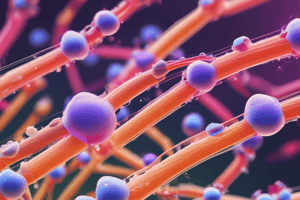Podcast
Questions and Answers
What is the primary role of 3’-Phosphoadenosyl-5’-Phosphosulfate (PAPS) in metabolic processes?
What is the primary role of 3’-Phosphoadenosyl-5’-Phosphosulfate (PAPS) in metabolic processes?
- It serves as a sulfur donor in glycosphingolipid synthesis. (correct)
- It acts as an energy source for cellular respiration.
- It is a critical component of DNA synthesis.
- It facilitates the hydrolysis of polysaccharides.
Which enzyme is responsible for sulfation of carbohydrate chains?
Which enzyme is responsible for sulfation of carbohydrate chains?
- Sulfotransferase (correct)
- Sulfide reductase
- Glucuronic acid transferase
- Uronosyl 5-Epimerase
A defect in the process of sulfation may lead to which of the following disorders?
A defect in the process of sulfation may lead to which of the following disorders?
- Autosomal recessive disorders affecting skeletal development (correct)
- Cardiovascular diseases
- Diabetes mellitus
- Arthritis
What type of reaction does Uronosyl 5-Epimerase catalyze?
What type of reaction does Uronosyl 5-Epimerase catalyze?
In which cellular organelle does core protein synthesis occur?
In which cellular organelle does core protein synthesis occur?
What occurs to core proteins as they move through the ER?
What occurs to core proteins as they move through the ER?
What is the primary function of glucuronic acid in sulfation?
What is the primary function of glucuronic acid in sulfation?
What type of biochemical disorder can arise from a defect in glucuronic acid incorporation?
What type of biochemical disorder can arise from a defect in glucuronic acid incorporation?
Which of the following statements about 3’-Phosphoadenosyl-5’-Phosphosulfate (PAPS) is NOT true?
Which of the following statements about 3’-Phosphoadenosyl-5’-Phosphosulfate (PAPS) is NOT true?
Which of the following sugar nucleotides serves as a precursor for glycoproteins?
Which of the following sugar nucleotides serves as a precursor for glycoproteins?
What type of amino acid R-groups are specifically targeted for glycosylation by oligosaccharides?
What type of amino acid R-groups are specifically targeted for glycosylation by oligosaccharides?
Which of the following statements concerning UDP-N-acetylgalactosamine is true?
Which of the following statements concerning UDP-N-acetylgalactosamine is true?
What is a common fate of N-linked glycoproteins within the cell?
What is a common fate of N-linked glycoproteins within the cell?
How are GDP-fucose and GDP-mannose related in terms of biosynthesis?
How are GDP-fucose and GDP-mannose related in terms of biosynthesis?
What is the significance of the negative charge of CMP-NANA at physiological pH?
What is the significance of the negative charge of CMP-NANA at physiological pH?
Which of the following is NOT a sugar nucleotide involved in glycoprotein synthesis?
Which of the following is NOT a sugar nucleotide involved in glycoprotein synthesis?
In what cellular compartment does the glycosylation process occur for proteins synthesized on the ER?
In what cellular compartment does the glycosylation process occur for proteins synthesized on the ER?
Which type of glycosylation involves the transfer of N-acetylgalactosamine from UDP-N-galactosamine?
Which type of glycosylation involves the transfer of N-acetylgalactosamine from UDP-N-galactosamine?
What structural role do carbohydrates play in glycoproteins?
What structural role do carbohydrates play in glycoproteins?
What type of bond is formed between xylose and the hydroxyl group of serine?
What type of bond is formed between xylose and the hydroxyl group of serine?
The alternating residues in bacterial cell walls consist mainly of which two components?
The alternating residues in bacterial cell walls consist mainly of which two components?
Which molecule cleaves the glycosidic bond between N-acetylmuramic acid and N-acetylglucosamine?
Which molecule cleaves the glycosidic bond between N-acetylmuramic acid and N-acetylglucosamine?
What is the role of penicillin in relation to peptidoglycan?
What is the role of penicillin in relation to peptidoglycan?
What happens in glycoprotein storage diseases due to enzyme deficiency?
What happens in glycoprotein storage diseases due to enzyme deficiency?
Lysosomal hydrolytic enzymes are typically characterized as which of the following?
Lysosomal hydrolytic enzymes are typically characterized as which of the following?
What is the significance of the low optimum pH (pH 5) in lysosomes?
What is the significance of the low optimum pH (pH 5) in lysosomes?
Which process begins the synthesis of the carbohydrate chain in lysosomes?
Which process begins the synthesis of the carbohydrate chain in lysosomes?
What is the half-life of hyaluronic acid within lysosomes?
What is the half-life of hyaluronic acid within lysosomes?
Which of the following statements about keratan sulfate is correct?
Which of the following statements about keratan sulfate is correct?
What occurs after a vesicle containing phagocytosed material fuses with a lysosome?
What occurs after a vesicle containing phagocytosed material fuses with a lysosome?
Which enzyme is responsible for catalyzing the transfer of xylose in carbohydrate synthesis?
Which enzyme is responsible for catalyzing the transfer of xylose in carbohydrate synthesis?
What type of enzymes are found in lysosomes?
What type of enzymes are found in lysosomes?
How does sulfation occur during the synthesis of the carbohydrate chain?
How does sulfation occur during the synthesis of the carbohydrate chain?
In what condition are lysosomal enzymes active?
In what condition are lysosomal enzymes active?
What is the role of acid hydrolases in lysosomes?
What is the role of acid hydrolases in lysosomes?
What is required for the synthesis of N-Linked glycosides?
What is required for the synthesis of N-Linked glycosides?
Where does the synthesis of dolichol-linked oligosaccharides occur?
Where does the synthesis of dolichol-linked oligosaccharides occur?
Which of the following sugars is NOT part of the oligosaccharide constructed on dolichol?
Which of the following sugars is NOT part of the oligosaccharide constructed on dolichol?
What characterizes the final processing of N-Linked oligosaccharides?
What characterizes the final processing of N-Linked oligosaccharides?
Which of the following is a characteristic of conditions caused by defects in N-Linked glycosylation?
Which of the following is a characteristic of conditions caused by defects in N-Linked glycosylation?
What happens to the oligosaccharide during its transfer from dolichol to protein?
What happens to the oligosaccharide during its transfer from dolichol to protein?
Which glycosaminoglycan (GAG) is not covalently attached to protein to form proteoglycans?
Which glycosaminoglycan (GAG) is not covalently attached to protein to form proteoglycans?
Which feature is least likely to be associated with N-Linked glycosylation disorders?
Which feature is least likely to be associated with N-Linked glycosylation disorders?
What does the removal of specific residues during N-Linked oligosaccharide processing primarily lead to?
What does the removal of specific residues during N-Linked oligosaccharide processing primarily lead to?
Which of the following substances is most directly linked through a pyrophosphate linkage to the oligosaccharide during its synthesis?
Which of the following substances is most directly linked through a pyrophosphate linkage to the oligosaccharide during its synthesis?
Study Notes
3’-Phosphoadenosyl-5’-Phosphosulfate (PAPS)
- PAPS is a molecule of AMP with a sulfate group attached to the 5’-phosphate.
- Synthesis occurs after D-glucuronic acid is incorporated into the carbohydrate chain.
- Acts as a source of sulfate and a sulfur donor in glycosphingolipid synthesis.
Sulfotransferase and Sulfation
- Sulfotransferase facilitates sulfation of carbohydrate chains at specific sites.
- Defects in sulfation can lead to autosomal recessive disorders affecting skeletal system development.
Core Protein Synthesis
- Proteins synthesized in the endoplasmic reticulum (ER) are glycosylated by membrane-bound transferases.
Degradation of Glycosaminoglycans (GAGs)
- GAG degradation occurs in lysosomes, containing hydrolytic enzymes active at pH 5, known as acid hydrolases.
- Low pH protects the cell by preventing lysosomal enzymes from functioning in neutral cytosol.
- GAGs have varying half-lives: hyaluronic acid (3 days), chondroitin and dermatan sulfate (10 days), keratan sulfate (120 days).
Synthesis of Carbohydrate Chain
- Initiated by transferring xylose from UDP-xylose to serine/threonine hydroxyl group, catalyzed by xylosyltransferase.
- Sequential addition of sugars occurs, involving alternating acidic and amino sugars and conversion of D-glucuronyl to L-iduronyl residues.
Addition of Sulfate Groups
- Sulfation occurs after monosaccharides are incorporated into the growing carbohydrate chain.
Phagocytosis of GAGs
- GAGs are phagocytosed into a vesicle that fuses with the lysosome, forming a phagolysosome for degradation.
Sugar Nucleotides
- Serve as precursors for glycoprotein carbohydrate components, including UDP-glucose, UDP-galactose, UDP-N-acetylglucosamine, and others such as GDP-mannose.
Glycosylation of Proteins
- Oligosaccharides are attached to specific amino acid R-groups based on protein's 3D structure.
- Synthesis of O-linked glycosides occurs in the ER, transferring N-acetylgalactosamine onto seryl or threonyl R-groups.
Synthesis of N-Linked Glycosides
- Occurs in the ER and Golgi apparatus, requiring dolichol and dolichol pyrophosphate.
- Final processing involves removal of initial sugar residues and addition of various sugars.
Structure of Proteoglycans
- All GAGs, except hyaluronic acid, attach covalently to proteins, forming proteoglycan monomers through O-glycosidic bonds to serine residues.
Bacterial Cell Wall Polysaccharides
- Comprise alternating β (1→4)-linked N-acetylmuramic acid and N-acetylglucosamine residues, forming a mesh framework through cross-linking tetrapeptides.
Enzymatic Actions
- Lysozyme cleaves glycosidic bonds in peptidoglycan, aiding in degradation.
- Penicillin inhibits cross-link formation in peptidoglycan, serving as an antibiotic.
Lysosomal Glycoprotein Degradation
- Lysosomal enzymes remove specific components of glycoproteins sequentially, primarily as exoenzymes.
Glycoprotein Storage Diseases
- Result from deficiencies in degradative enzymes, causing accumulation of partially degraded structures in lysosomes.
- Symptoms correlate with enzyme deficiencies seen in mucopolysaccharidoses and glycolipid degradation issues.
Studying That Suits You
Use AI to generate personalized quizzes and flashcards to suit your learning preferences.
Related Documents
Description
This quiz covers the biochemistry of 3’-Phosphoadenosyl-5’-Phosphosulfate (PAPS), its role in sulfation and glycosaminoglycan (GAG) degradation. Explore the mechanisms of sulfotransferase, synthesis of core proteins, and the effects of sulfation defects on skeletal development.




